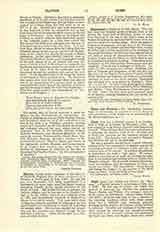

Clayton, JAMES, priest, confessor of the faith, b. at Sheffield, England, date of birth not known; d. a prisoner in Derby gaol, July 22, 1588. He was the son of a shoemaker, and, being apprenticed to a blacksmith for seven years, spent his leisure hours in educating himself, giving special attention to the study of Latin. His studies led him to embrace the Catholic religion, and he was sent to the English College at Reims (1582), where he was ordained priest in 1585, and immediately returned to England to labor in his native county. Four years later, while visiting the Catholic prisoners in Derby gail, he was apprehended and condemned to death for exercising his priestly office. His brothers pleaded for his pardon and his execution was delayed, though he was still kept a prisoner. Prison life brought on a sickness of which he died.
G. E. HIND

